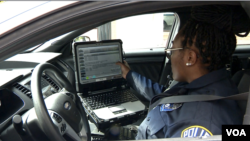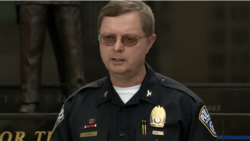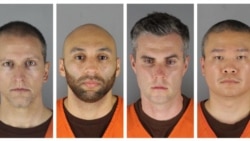Patrice Malone has been a police officer for two years with the Arlington County police force in the American state of Virginia. She believes going to college made her better at her job. In college, Malone studied criminal justice.
She told VOA that college also taught her how to deal well with people. And it gave her courage and “patience, a lot of patience, to go out, talk to people.”
The deaths of several Black men and women in the United States by police have put attention on problems with police training. Arlington County requires its officers to have college or other experience. That puts the Virginia law enforcement agency in the minority. Based on a 2017 study, more than 80 percent of U.S. law enforcement agencies require only completion of high school.
Jay Farr is Chief of Police for Arlington County. He told VOA he noticed a difference earlier in his career while working for a smaller police force that did not require higher education.
Not to be judgmental, he said, but he thinks the mentality of a lot of police he worked with was very limited. Many were not “exposed to different points of view” and were not challenged in an educational environment. Farr said he thinks that really made a difference in “how they work within the community.”
Farr is a college professor and a strong believer in higher education for police officers.
“College teaches you how to be a critical thinker. A big part of the college experience is for you to look at things and to think through them beyond the obvious,” he said. With regard to technical skills, going to college does not necessarily make people better police officers, Farr notes. “I think it makes them a much better officer in having the ability to be more willing or open to dealing with different cultures, different points of view, (a) different thought process.”
Gaylene Armstrong is director of the School of Criminology and Criminal Justice at the University of Nebraska Omaha. She says police these days are required to do more than they used to be within the criminal justice system.
“We call on our police officers to be part law enforcement, part social worker, part assisting individuals who are in mental health crisis,” Armstrong said. “Our law enforcement officials in America are some of our first responders to all kinds of crises and need(s) situations.”
In addition to the usual police training, a college education could help officers deal with their growing role in society.
The hope is that, with a broader education and more professional skills, police would be better at de-escalation through spoken communication, Armstrong said.
A 2010 study published in Police Quarterly found that college-educated police officers are 40 percent less likely to use physical force on the job.
It appears a college education did not change the outcome for George Floyd. The Minnesota man died in May after a police officer knelt on his neck for nearly nine minutes. Three of the four officers charged in relation to Floyd’s death reportedly had completed college.
Speaking about the Black Lives Matter protests that came after Floyd’s death, Farr believes concerns about police training are valid. However, money and resources make it difficult to set national guidelines for the training and education of law enforcement officers.
Farr said it is very important for police officers to understand their own biases and deal with them. He added that it is dispiriting when people think all cops are abusive and use excessive force.
Patrice Malone has recently noticed a difference in some of the people she deals with on the job.
“It's changed a little bit,” she says. “The community might be a little distant. But … you just go out. You do the same thing that you did before. You just reassure the community that you're there for them, that you're there for their safety. And that's how you regain their trust.”
I’m Alice Bryant.
Dora Merkouar wrote this story for VOA News. Alice Bryant adapted it for Learning English. Hai Do was the editor.
________________________________________________________________
Words in This Story
college - n. a school in the U.S. that you go to after high school (often a university)
courage - n. the ability to do something that you know is difficult or dangerous
expose - v. to cause someone to experience something or to be influenced or affected by something
challenge - v. to test the ability, skill, or strength of someone or something
role - n. a part that someone or something has in a particular activity or situation
de-escalation - n. the decrease in the level of conflict in a situation
kneel - v. to move your body so that one or both of your knees are on the floor
valid - adj. fair or reasonable
reassure - v. to make someone feel less afraid, upset, or doubtful







